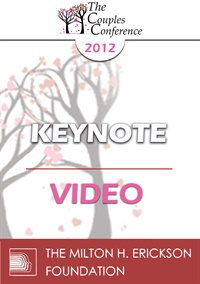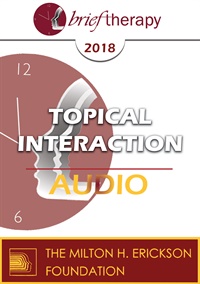
- Average Rating:
- Not yet rated
- Topic Areas:
- Topical Interactions | Psychotherapy | Brief Therapy | Therapeutic Relationship | Therapist Development
- Categories:
- Brief Therapy Conference | Brief Therapy Conference 2018
- Faculty:
- Stephen Gilligan, PhD
- Duration:
- 1:04:33
- Format:
- Audio Only
- Original Program Date:
- Dec 08, 2018
- Short Description:
- Every meaningful therapy conversation includes a significant presence of difficult emotions--symptoms, responses, anger, fear, etc. We will have a conversation about how to skillfully welcome and utilize such negative experiences as integral parts of a successful, creative therapy.
- Price:
- $15.00 - Base Price
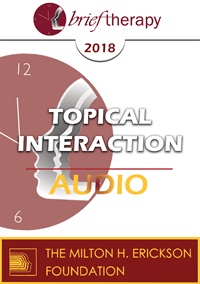
- Average Rating:
- Not yet rated
- Topic Areas:
- Topical Interactions | Psychotherapy | Femininity | Supervision
- Categories:
- Brief Therapy Conference | Brief Therapy Conference 2018
- Faculty:
- Laura Brown, PhD
- Duration:
- 57:06
- Format:
- Audio Only
- Original Program Date:
- Dec 08, 2018
- Short Description:
- There is a dynamic tension between the necessarily hierarchical structure of psychotherapy supervision and the liberatory/egalitarian models of feminist and other liberatory practices. This will be a chance for psychotherapy supervisors who are struggling with this dilemma to discuss this topic with the author of the feminist model of psychotherapy supervision
- Price:
- $15.00 - Base Price
Tags: Feminine Psychotherapy Supervision
Credit available - Click Here for more information
- Average Rating:
- Not yet rated
- Topic Areas:
- Workshops | Brief Therapy | Evocative Communication | Metaphors | Strategic Therapy | Utilization | Psychotherapy
- Categories:
- Brief Therapy Conference | Brief Therapy Conference 2018 | Online Continuing Education
- Faculty:
- Jeffrey Zeig, PhD
- Course Levels:
- Master Degree or Higher in Health-Related Field
- Duration:
- 1:45:53
- Format:
- Audio and Video
- Original Program Date:
- Dec 07, 2018
- Short Description:
- Three evocative orientations to psychotherapy, utilization, using metaphor, and strategic development, will be explained, demonstrated and practiced. There are components to each of these methods that will be addressed.
- Price:
-
Sale is $29.00
price reduced from Base Price - $59.00

- Average Rating:
- Not yet rated
- Topic Areas:
- Workshops | Brief Therapy | Generative Psychotherapy | Psychotherapy | Relationships | Therapist Development
- Categories:
- Brief Therapy Conference | Brief Therapy Conference 2018
- Faculty:
- Robert Dilts, BA
- Duration:
- 2:01:29
- Format:
- Audio Only
- Original Program Date:
- Dec 07, 2018
- Short Description:
- BT18 Workshop 14 - Applying Principles of Generative Coaching to Brief Therapy - Robert Dilts The core focus in Generative Coaching is creativity: How do you create a successful and meaningful work life? How do you create great personal relationships? How do you develop a great relationship with yourself—your body, your past, your future, your wounds, and your gifts? Generative change means creating something beyond what currently exists, whether in personal or professional life. It is not merely a cosmetic change, but a contextual shift that allows new levels of performance. Generative Coaching focuses on how to build the generative states needed to produce change and on how to maintain these states in order transform the obstacles and barriers that will inevitably arise.
- Price:
- $15.00 - Base Price
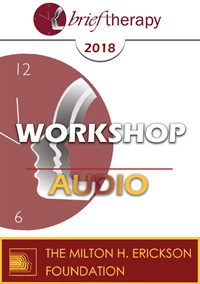
- Average Rating:
- Not yet rated
- Topic Areas:
- Workshops | Single-Session | Brief Therapy | Psychotherapy | Therapist Development
- Categories:
- Brief Therapy Conference | Brief Therapy Conference 2018
- Faculty:
- Michael Hoyt, PhD
- Duration:
- 1:35:35
- Format:
- Audio Only
- Original Program Date:
- Dec 07, 2018
- Short Description:
- Many therapies involve very brief lengths of treatment, including one session. A structure will be presented for organizing the tasks and skills involved in different phases (pre-, early, middle, late, follow-through) of therapy. Numerous case examples, including some on video, will illustrate brief therapy techniques applicable in both initial sessions and in the course of longer treatments.
- Price:
- $15.00 - Base Price
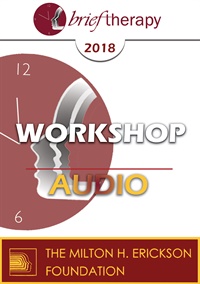
- Average Rating:
- Not yet rated
- Topic Areas:
- Workshops | Tailoring | Mindfulness | Psychotherapy | Brief Therapy
- Categories:
- Brief Therapy Conference | Brief Therapy Conference 2018
- Faculty:
- Ronald Siegel, PsyD
- Duration:
- 1:56:11
- Format:
- Audio Only
- Original Program Date:
- Dec 07, 2018
- Short Description:
- Mindfulness and compassion practices hold great promise not only for our own personal development, but also as remarkably powerful tools to augment virtually every form of psychotherapy. They are not, however, one-size-fits-all remedies. Practices need to be tailored to fit the needs of particular individuals—and this presentation will show you how to creatively adapt them to meet the needs of diverse people and conditions.
- Price:
- $15.00 - Base Price
- Average Rating:
- Not yet rated
- Topic Areas:
- Clinical Demonstrations | Ericksonian Psychotherapy | Psychotherapy | Brief Therapy
- Categories:
- Brief Therapy Conference | Brief Therapy Conference 1996
- Faculty:
- Jeffrey Zeig, PhD
- Course Levels:
- Master Degree or Higher in Health-Related Field
- Duration:
- 59:09
- Format:
- Audio and Video
- Original Program Date:
- Dec 13, 1996
- Short Description:
- BT96 Clinical Demonstration 01 - Brief Ericksonian Psychotherapy - Jeffrey Zeig, PhD
- Price:
-
Sale is $29.00
price reduced from Base Price - $59.00
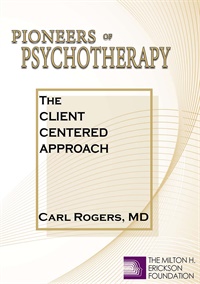
- Average Rating:
- Not yet rated
- Topic Areas:
- Clinical Demonstrations | Psychotherapy | Family Therapy
- Bundle(s):
- Pioneers of Psychotherapy Bundle
- Categories:
- Pioneers of Psychotherapy | Evolution of Psychotherapy | Evolution of Psychotherapy 1985
- Faculty:
- Carl Rogers, PhD
- Course Levels:
- Master Degree or Higher in Health-Related Field
- Duration:
- 00:59:00
- Format:
- Audio and Video
- Original Program Date:
- Dec 10, 1985
- Short Description:
- Carl Rogers (1985) demonstrates with Ann, who describes herself as suffering guilt and sadness after having put off becoming a mother to pursue her career. After deciding to have children, she miscarried twins and has since been unable to become pregnant. Rogers helps her access her own potential to experience herself more positively.
- Price:
- $59.00 - Base Price
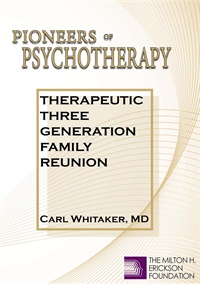
- Average Rating:
- Not yet rated
- Topic Areas:
- Clinical Demonstrations | Family Therapy | Psychotherapy
- Bundle(s):
- Pioneers of Psychotherapy Bundle
- Categories:
- Pioneers of Psychotherapy | Evolution of Psychotherapy | Evolution of Psychotherapy 1990
- Faculty:
- Carl Whitaker, MD
- Course Levels:
- Master Degree or Higher in Health-Related Field
- Duration:
- 00:59:00
- Format:
- Audio and Video
- Original Program Date:
- Dec 14, 1990
- Short Description:
- Carl Whitaker (1990) demonstrates consultation and therapy with a therapist who has brought a bilingual family with a mother who experiences anxiety attacks. The maternal grandmother, mother, father, and two children are engaged by Whitaker as he sits on the floor and experiments with different types of play and fantasy.
- Price:
- $59.00 - Base Price
- Average Rating:
- Not yet rated
- Topic Areas:
- Psychotherapy | Keynotes | Intimacy | Mindfulness | Love | Couples Therapy | Neuroscience
- Categories:
- Couples Conference | Couples Conference 2012
- Faculty:
- Rick Hanson, PhD
- Course Levels:
- Master Degree or Higher in Health-Related Field
- Duration:
- 59:50
- Format:
- Audio and Video
- Original Program Date:
- Apr 29, 2012
- Short Description:
- To compensate for the brain’s innate negativity bias – making it like Velcro for negative experiences but Teflon for positive ones, which sensitizes couples to hurts and conflicts and undermines psychotherapy – we’ll explore a vital method in self-directed neuroplasticity: identifying key positive experiences and then registering them deeply in implicit memory.
- Price:
-
Sale is $29.00
price reduced from Base Price - $59.00
Please wait ...




